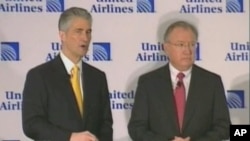Top executives at Chicago-based United and Houston-based Continental announced Monday that their two airlines planned to merge, creating the world's the biggest airline. The announcement comes less than a year after Delta Airlines and Northwest became one airline. Domestic and international fares could increase amid less competition.
The merger between United and Continental Airlines will be worth some $3 billion.
The combined company will have nearly 700 planes, 80,000 employees, and fly to 370 destinations in 59 countries.
Airline industry expert Joseph Schwieterman of DePaul University in Chicago says the announcement is a positive sign for an industry that has struggled since the 2001 terrorist attacks on New York and Washington.
"The U.S. airline industry is starting to think strategically again and knowing that they are in a position to have really global powerhouse roles," said Joseph Schwieterman.
The new company will be called United Airlines and will be slightly bigger than Delta Northwest, and the partnership between British Airways and Spain's Iberia.
A major concern for air travelers is that fares will increase because of less competition in the marketplace.
"The less competition, the higher average ticket prices," said Bijan Vasigh.
Economist and aviation consultant Bijan Vasigh of Embry-Riddle Aeronautical University in Daytona Beach, Florida:
"You are not competing any more with other airlines, therefore you can have more ability to increase the ticket price, without losing a significant amount of passengers," he said. "Therefore, despite the fact that airlines may hesitate to say that, 'OK, this doesn't have any [bearing] on the ticket price,' they are, I guess, wrong. They can increase ticket prices, and for sure we should see higher ticket prices after the merger than before the merger."
Many airlines already charge additional fees for services such as in-flight meals to baggage handling. Some apply additional charges to compensate for higher fuel costs.
Analyst Joseph Schwieterman says those fees, along with competition from low cost carriers and the public's ability to shop the Internet for low fares, will help keep ticket prices from rising after the United-Continental merger.
"Less choice certainly isn't going to lead to more fare wars, that's for sure," he said. "But you have to look at this trend in fares, how they come down when you adjust for inflation and fuel costs. They just seem to keep getting lower and lower. It's pretty evident that one merger isn't going to change that trend."
The merger will allow United to gain important hubs from Continental in Newark, New Jersey and Houston, Texas, allowing the new airline to better compete in Europe and Central and South America. United already has a strong presence in the Pacific region from its Los Angeles hub.
Schwieterman says the United-Continental merger is a major step in a global expansion that could mean similar moves between U.S. and foreign carriers are ahead.
"What U.S. airlines and even European airlines would really like is a merger across the Atlantic between airlines," said Schwieterman. "And I think that's the prize that the industry is working towards down the line. Funny enough, it's been the U.S. rules that have made that more difficult than the European rules. And I think that we're going to starting seeing pressure now to allow mergers between two different international carriers."
Although the boards of United and Continental have approved the merger, unions that represent workers at both companies as well as U.S. anti-trust regulators need to approve the deal before it can move forward.
US-based United and Continental Airlines Announce Merger, Creating World's Largest Airline
